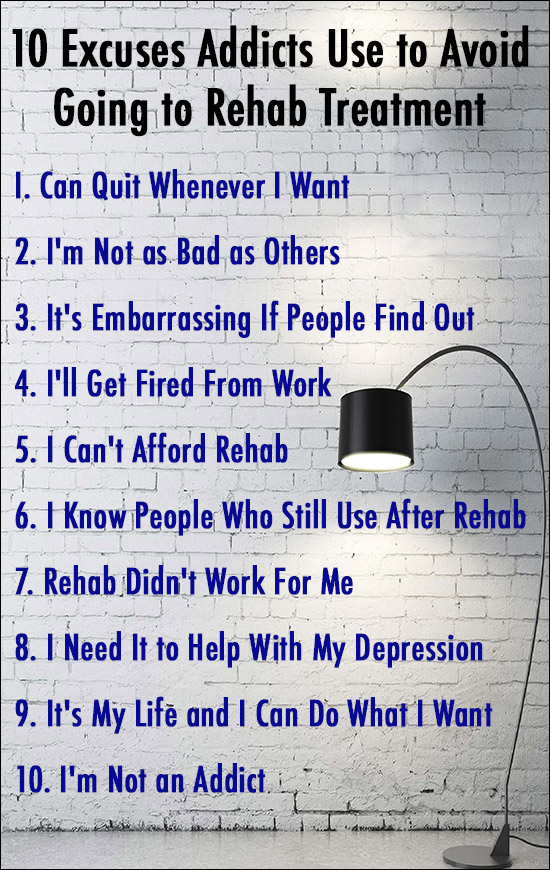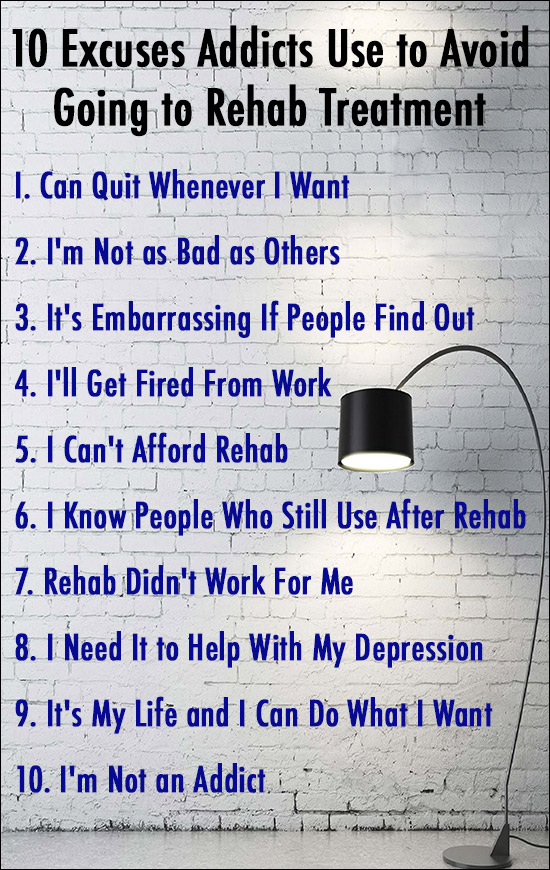10 Excuses Addicts Use to Avoid Going to Rehab Treatment

Making the decision to get treatment for issues related to substance abuse or addiction is an extremely personal and, in most cases, difficult process, so it’s not surprising that there are a variety of excuses addicts make to avoid going to rehab for treatment.
For some people, their struggles with addiction have cost them everything, from their jobs, friends and family to their home. In that situation, it might feel like there’s not even an available path to rehab, recovery and a return to normalcy.
There is also a large demographic battling substance abuse issues that haven’t lost everything.
Perhaps drug and alcohol use is causing some chaos in their life, but they may have periods of sobriety, make promises to their family, friends and loved ones and are able to hold it together for a little while.
They do all of this, despite the lingering knowledge that they, very likely, have a problem with addiction.

According to data in the National Survey on Drug Use and Health (NSDUH), more than 20 million people needed treatment for a substance use disorder in 2017, but only an estimated 4 million got the care they needed.
Here are 10 Common Excuses Addicts Use to Avoid Going to Treatment
1. I Can Quit Using Drugs or Alcohol Whenever I Want
This a very popular excuse used by people that enjoy using drugs or alcohol and don’t think they have a problem, despite what friends or family members have told them. Many of them truly believe they can stop because they don’t have a problem.
For other people using this excuse, they may have already tried multiple times to either curb their substance abuse or stop altogether and failed. With untreated addiction, both physical and mental symptoms will continue to worsen over time.
2. Compared to Other People I Know, I Don’t Have a Problem at All
Many people struggling with substance use disorders surround themselves with, or run in circles where their addictive behavior is not out of the ordinary. As a result, they may compare themselves to friends or family members who have had legal troubles or health related issues because of drug and alcohol abuse.
Pointing a finger at others who have it worse may make a person feel better, but it also prolongs their dependency issues because, at this point at least, they’re unwilling to examine their own feelings and behavior.
3. It Will Be Embarrassing If My Family and Friends Find Out I Have a Problem
In most cases, family and friends might already have an idea that their loved one is hiding something from them.
However, even if they don’t know that their loved one is battling an addiction, being honest and getting treatment may help lessen the long-term damage that untreated addiction can inflict on everyone in a person’s life.
4. I Will Get Fired If My Employer Finds About My Problem and I Have to Go to Rehab
The Family Medical Leave Act (FMLA) in many cases can provide a person some protection from losing their job if they go to rehab. This act allows for up to 12 weeks of unpaid time off for medical treatment, including addiction treatment.
The law applies to all public agencies and to companies with 50 or more employees.
5. Going to Rehab is Too Expensive and I Can’t Afford It
The cost of medical care can seem overwhelming, and some addiction treatment programs are more expensive than others, especially if they have doctors on staff and offer medical detox and dual diagnosis treatment for mental health issues combined with addiction.
One thing to remember is that if someone else in our life that we love is experiencing serious health problems, we would explore every available option. With drug and alcohol rehab, there are often affordable options.
When considering any treatment facility, ask about payment options, scholarships, and shared rooms to reduce the cost.
6. I Know People Who Went to Rehab, Relapsed and Are Still Using Drugs and Alcohol
Relapsing with drugs and alcohol after addiction treatment is very common and it certainly doesn’t mean that rehab didn’t work for that person.
The rate of relapse due to addiction is similar to the rates of relapse for other chronic illnesses, such as cancer or diabetes, according to the National Institute on Drug Abuse (NIDA). Sometimes, relapse is a part of the recovery process, but there are approaches, like relapse prevention therapy, that many rehab facilities offer to reduce the likelihood of this outcome.
7. I’ve Already Been Through Treatment and It Didn’t Work For Me
The chronic nature of addiction means that it might take more than just one round of treatment for a person to get a solid foothold in recovery and sobriety.
As an example, one study found that it takes about 30 attempts for cigarette smokers to go one year without a cigarette.
The point here is that recovery from an addiction to alcohol or drugs may take repeated attempts over several years, but it is a struggle worth continuing because the alternatives are dire.
The ultimate goal is to increase the quality of life that can only be found through recovery. For many, that means staying out of jail or staying alive long enough for recovery to be successful.
8. I Won’t Be Able to Cope With My Stress and Depression Without Drugs and Alcohol
Substance abuse and addiction is often the result of people self-medicating, unwittingly trying to treat the symptoms of anxiety, stress and depression.
Over time, they become so used to this type of coping mechanism that they don’t see any other way of living their life.
In fact, treatment for a substance use disorder will address these issues and provide tools, such as one-on-one counseling, group counseling or approaches like cognitive behavioral therapy (CBT), that help to examine and combat these internal and external drivers of stress, anxiety and depression.
9. It’s My Life, I Can Do What I Want as Long as I’m Not Hurting Anyone Else
This sounds like a very rational excuse, but in truth, untreated addiction is never a victimless disease.
Watching as a loved one slide deeper and deeper into an addiction can cause permanent emotional damage and trauma in family and friends. It’s entirely common for addiction issues to tear families apart.
Another fact is that addiction causes a person to engage in risky behaviors, such as unprotected sex, driving while under the influence and others, which pose a danger to society as a whole.
10. I’m Not an Addict and Don’t Need Treatment
Denial is one of the most common symptoms of addiction. Actually, one definition of the disease is continuing to use drugs or alcohol despite the problems it’s causing.
Not everyone loses their job or is homeless because of their substance abuse issues.
Other negative consequences a person may be experiencing can be alcohol-induced blackouts, intense mood swings, substance-related depression and many others that affect those around them too.
While these problems might not be considered “as severe,” they are signs of addiction, and continuing to deny that there is a problem will only make these problems worse.
These are 10 of the most common excuses addicts use to avoid going to rehab, but they aren’t the only ones.
It’s been said many times that addiction is the only disease that tries to convince you that you don’t have it.
Addiction is a disease like no other that changes the structure and function of the brain, and part of the changes impact rational thinking, which is an important reason why addicts don’t think they have a problem.
They have lost the capacity to understand exactly what is happening to their life and many truly believe they don’t need to go to rehab.
For anyone that remotely thinks they might have a problem with drugs or alcohol, please consider speaking with a professional just to make sure.
Related:
 Pathways Drug Rehabilitation Luxury Addiction Treatment & Detox Center
Pathways Drug Rehabilitation Luxury Addiction Treatment & Detox Center


